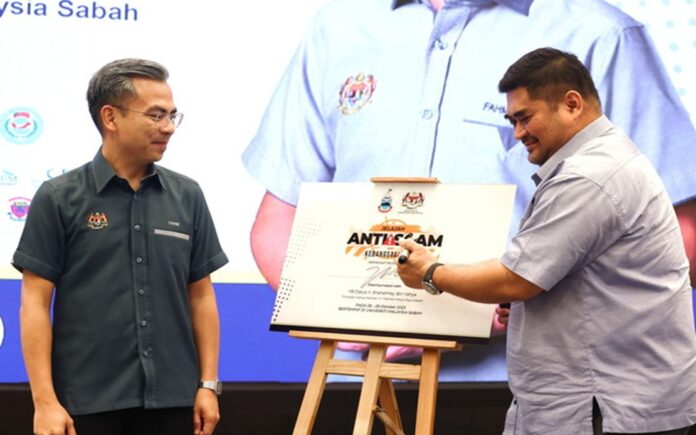KOTA KINABALU, Oct 28 — Communications and Digital Minister Fahmi Fadzil has suggested that phishing simulation be implemented as one of the proactive measures to raise public awareness in relation to cyber security and scam threats.
He said this was important considering the high number of scam and online fraud cases which are serious problems in the country, especially in the 17 to 40 age group, who made up most of the victims.
“I will discuss with several parties in the Anti-Scam Action Coalition (GBAS) for us to implement it as soon as possible. This will help raise awareness (about cyber security and scams).
“The issue is when we talk about a type of scam, maybe next week or even this evening there will be a new type of scam (by cyber criminals). This is one of our constraints because they (cyber criminals) are too creative,” he said.
“Therefore, we are studying from several aspects. I think depending on a series of tours (to raise awareness of cyber security and threats of scams) alone is not enough, (and) it can be organised in several other ways.”
Fahmi said this to reporters after attending the Sabah State-Level 2023 National Anti-Scam Tour at Universiti Malaysia Sabah (UMS) here today.
The two-day programme, which ends tomorrow, was officiated by Sabah Deputy Chief Minister III Datuk Shahelmey Yahya who represented Chief Minister Datuk Seri Hajiji Noor.
This programme was organised by CyberSecurity Malaysia and CelcomDigi in collaboration with GBAS as well as with the support of the Ministry of Communications and Digital to provide knowledge to the community about various types of scams, latest modus operandi (of scammers) and tips to avoid from easily falling victim to scammers.
Sabah is the fourth state in the tour series after Selangor/Kuala Lumpur, Perlis and Sarawak, and the tour will move on to Kelantan, Johor before ending in Putrajaya.
Earlier, Fahmi in his speech said the Cyber999 Cyber Incident Response Centre, operated by CyberSecurity Malaysia, recorded a total of 4,381 cyber security incidents from January to September this year.
A total of 2,788 incidents or 64 per cent were related to online fraud, he said.
“Due to this, a variety of efforts, initiatives as well as campaigns related to scams and online fraud need to be intensified and expanded at all levels of society with a more creative and comprehensive approach,” he said.
Meanwhile, Fahmi said the government has allocated a total of RM20 million to the National Scam Response Centre in Budget 2024 to increase efforts to combat such crimes.
“This will at the same time prove that the Unity Government takes a very serious view of online fraud issues and will continue to strengthen cyber security,” he said, adding that the people too need to raise their awareness of this matter.



















